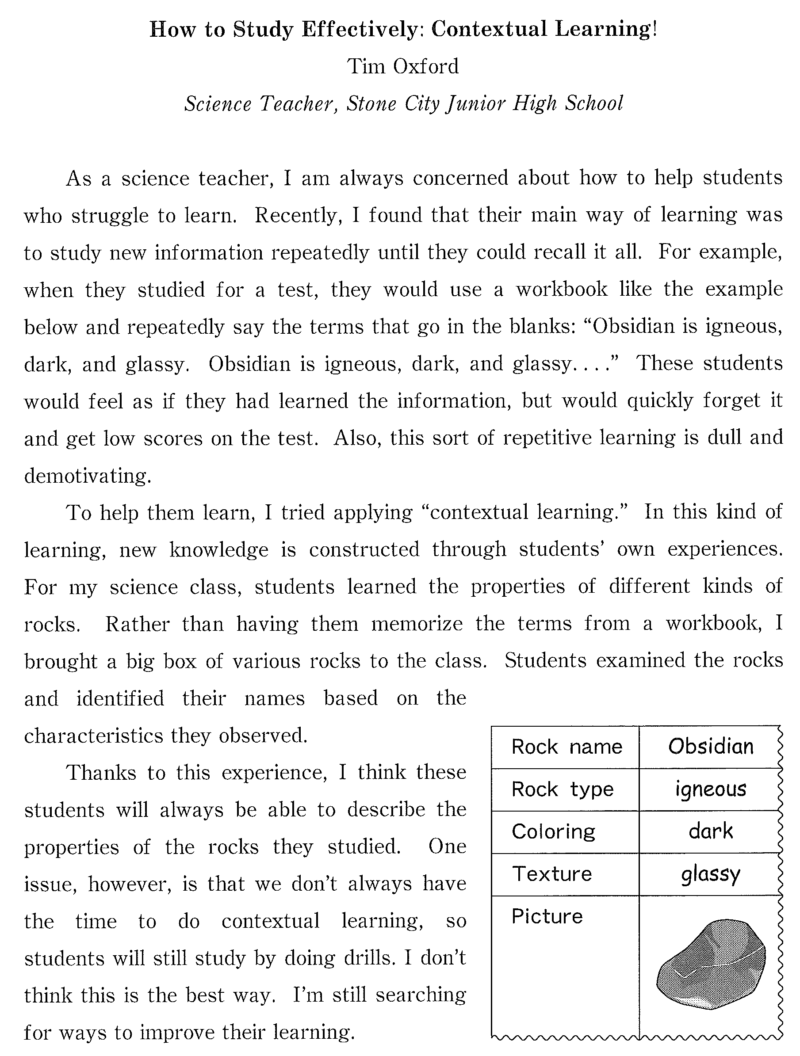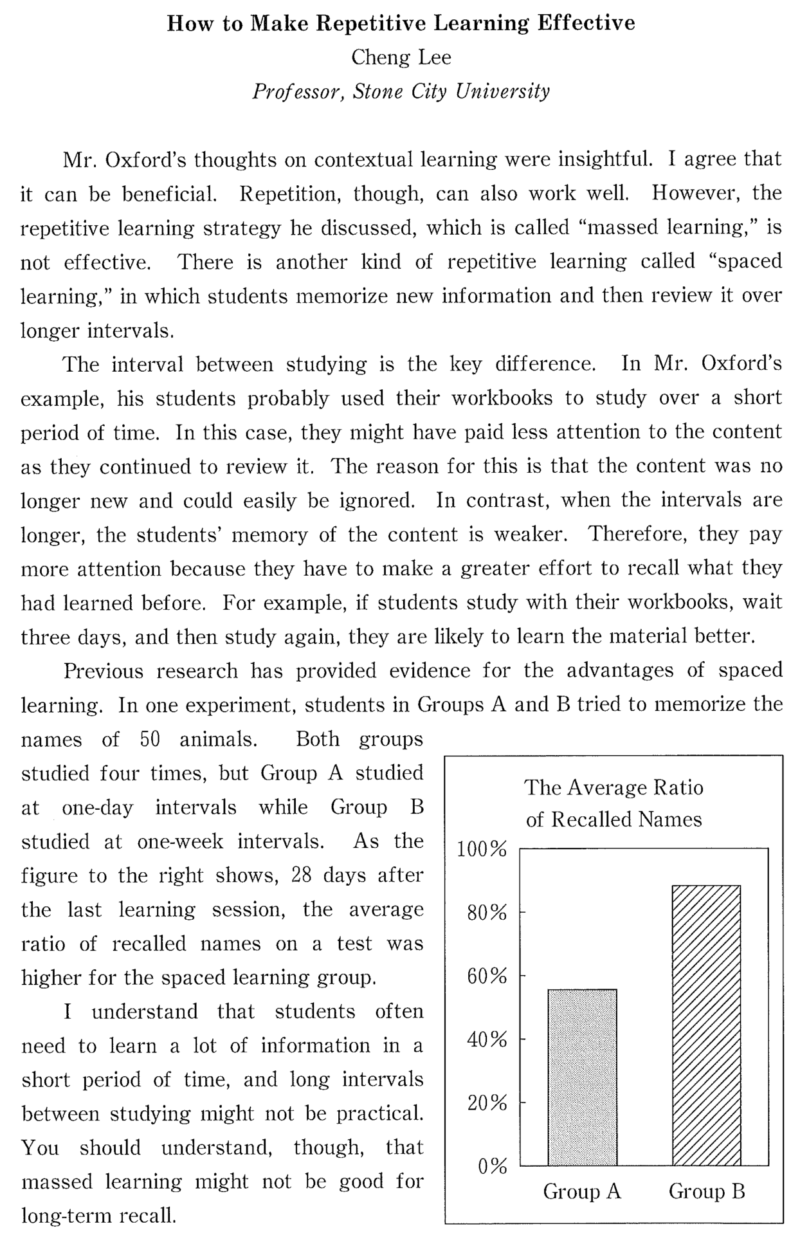2023年度の大学入学共通テスト英語第4問の解説をしています。疑問点が残らないよう、解き方の手順も踏まえて一問一問どこよりも丁寧に説明します。
問題
Your teacher has asked you to read two articles about effective ways to study. You will discuss what you learned in your next class.


問1 Oxford believes that ( 24 ).
- continuous drilling is boring
- reading an explanation of terms is helpful
- students are not interested in science
- studying with a workbook leads to success
問2 In the study discussed by Lee, students took a test ( 25 ) after their final session.
- four weeks
- immediately
- one day
- one week
問3 Lee introduces spaced learning, which involves studying at ( 26 ) intervals, in order to overcome the disadvantages of ( 27 ) learning that Oxford discussed. (Choose the best one for each box from options 1~6.)
- contextual
- extended
- fixed
- irregular
- massed
- practical
問4 Both writers agree that ( 28 ) is helpful for remembering new information.
- experiential learning
- having proper rest
- long-term attention
- studying with workbooks
問5 Which additional information would be the best to further support Lee’s argument for spaced learning?
- The main factor that makes a science class attractive
- The most effective length of intervals for spaced learning
- Whether students’ workbooks include visuals or not
- Why Oxford’s students could not memorize information well
解説 問1
Oxford believes that ( 24 ).
オックスフォードは( 24 )ということを信じています
選択肢を確認しましょう。
1. continuous drilling is boring
連続的な反復練習は退屈です
Oxford の記事の第一段落の最後に、こうあります。
Also, this sort of repetitive learning is dull and demotivating.
また、この種の反復学習は退屈で意欲をそそります。
ということで、この選択肢が正解です。
2. reading an explanation of terms is helpful
用語の説明を読むと役に立つ
Oxford の記事の第二段落に、こうあります。
Rather than having them memorize the terms from a workbook, I brought a big box of various rocks to the class.
ワークブックで用語を暗記させるのではなく、さまざまな石が入った大きな箱をクラスに持ってきました。
読むよりも、体験させる方がいいと考えているようです。この選択肢は違います。
3. students are not interested in science
学生は科学に興味がない
Oxford の記事の第二段落の最後に、こうあります。
Student examined the rocks and identified their names based on the characteristics they observed.
生徒は岩を調べ、観察した特徴に基づいて名前を特定しました。
生徒たちは前向きに取り組んでいるようです。もちろんここだけで、生徒たちは科学に興味を持っていると断言はできません。ですが Oxford の記事の中に「科学に興味がない」という記述はありません。
この選択肢は違います。
4. studying with a workbook leads to success
ワークブックでの勉強は成功につながる
選択肢「2」でも確認したとおり、ワークブックで勉強するよりも、体験させる方がいいと考えているようです。この選択肢は違います。
ということで、正解は「1」です。

Oxford の記事に関する設問なので、本文の Oxford の部分を読み終わったら、すぐにこの問題に取り組むのがいいでしょう。
解説 問2
In the study discussed by Lee, students took a test ( 25 ) after their final session.
リーによって論じられた研究では、学生は最終セッションの( 25 )後にテストを受けました
Lee の記事の第三段落に、こうあります。
As the figure to the right shows, 28 days after the last leaning session, the average ratio of recalled names on a test was higher for the spaced learning group.
右の図が示すように、最後の学習セッションから 28 日後、テストでの名前の平均的な記憶率は、間隔を空けて学習したグループの方が高かった。
選択肢はこうなっています。
1. four weeks
四週間
2. immediately
すぐに
3. one day
一日
4. one week
一週間
28日後ですから、28÷7=4 で「四週間」です。ということで、正解は「1」です。
ちなみに「one day 」と「one week」については、本文にこうあります。
Both groups studied four times, but Group A studied at one-day intervals while Group B studied at one-week intervals.
どちらのグループも 4 回勉強しましたが、グループ A は 1 日間隔で勉強し、グループ B は 1 週間間隔で勉強しました
それぞれ勉強の間隔についてのものでした。ということで、それらの選択肢は違います。

こちらは Lee の記事に関する設問なので、本文の Lee の部分を読み終わってから、問題に取り組むのがいいでしょう。読んだときに、数字に印をしておくと後で見返しやすいです。
解説 問3
Lee introduces spaced learning, which involves studying at ( 26 ) intervals, in order to overcome the disadvantages of ( 27 ) learning that Oxford discussed. (Choose the best one for each box from options 1~6.)
リーは、オックスフォードが論じた( 27 )学習の欠点を克服するために、( 26 )間隔で勉強することを含む spaced learning を導入します。(選択肢1~6の中から各ボックスに最適なものを1つ選べ)
空欄が二つあって、そこに入る言葉を選択肢から選ぶ問題です。
これは( 27 )の方がわかりやすいです。「( 27 )の欠点を克服する」とありますので、よくない学習方法がそこに入るはずです。
それについて、Lee の記事の第一段落に、こうあります。
However, the repetitive learning strategy he discussed, which is called “massed learning,” is not effective.
しかし、彼が論じた「massed learning」と呼ばれる反復学習戦略は、効果的ではありません。
ということで、( 27 )に入るのは、選択肢「5」の「massed」です。
設問の文によると、その「massed learning」を改善したのが、Lee の紹介する「space learning」です。その「space learning」がどういう学習方法なのかが、( 26 )に入ります。
「space learning」について、第一段落の最後に、こうあります。
There is another kind of repetitive learning called “spaced learning,” in which students memorize new information and then review it over longer intervals.
「spaced learning」と呼ばれる別の種類の反復学習があります。それは生徒が新しい情報を記憶し、それをより長い間隔で復習するというものです
本文には「longer intervals」とあります。では、選択肢を確認しましょう。
1. contextual / 文脈上の
2. extended / 延長した
3. fixed / 固定した
4. irregular / 不規則な
5. massed / 密集した
6. practical / 実践的な
残念ながら、本文にあった「longer」という選択肢はありません。ですが、似た言葉はありますね。「2」の extended です。これが( 26 )に入る単語です。
ということで、正解は( 26 )→「2」、( 27 )→「5」です。

「1」の contextual は、Oxford の方に「contextual learning / 文脈学習」として出てきます。表面的ではなく、本質的な学びを得るものとして注目されています。今はやりの「アクティブラーニング」とも通じる内容ですね。
解説 問4
Both writers agree that ( 28 ) is helpful for remembering new information.
両方の筆者は、( 28 )が新しい情報を覚えるのに役立つと同意しています
Oxford は「contextual learning」、Lee は「spaced learning」を紹介しています。果たして両方の人が、共通して役立つと言っている方法ってあったでしょうか。
実は Lee の記事の一番最初にこうあります。
Mr. Oxford’s thoughts on contextual learning were insightful. I agree that it can be beneficial.
「contextual learning」に関するオックスフォード氏の考えは洞察力に富んでいました。有益であることに同意します
ということで、Oxford はもちろん、Lee も「contextual learning」が役に立つと考えています。それを踏まえて、選択肢を確認しましょう。
1. experiential learning
経験にもとづく学習
2. having proper rest
適度な休憩
3. long-term attention
長い期間の注意
4. studying with workbooks
ワークブックを使った勉強
直接「contextual learning」という言葉はありません。ですが、Oxford の記事に「contextual learning」について、こうあります。
In this kind of learning, new knowledge is constructed through students’ own experiences.
この種類の学習では、生徒自身の経験を通じて新しい知識が構築されます
「経験」がポイントですね。ということで、正解は「1」です。

二人がそれぞれ別の学習方法を紹介していますので、「共通するものってあったっけ?」となりかねません。設問を読んだとき、agree という単語が頭にあれば、Lee の記事を読んだときに、すぐ気づくことができたかもしれません。
解説 問5
Which additional information would be the best to further support Lee’s argument for spaced learning?
リーの「spaced learning」の主張をさらに裏付けるには、どの追加情報が最適ですか
これは Lee の記事を全部読んだうえで、考える問題です。ちなみに「spaced learning」の実験はこのように行われました。
Both groups studied four times, but Group A studied at one-day intervals while Group B studied at one-week intervals.
どちらのグループも 4 回勉強しましたが、グループ A は 1 日間隔で勉強し、グループ B は 1 週間間隔で勉強しました
そしてその結果は、本文の右側の表にありましたが、Group A は約60%、Group B は約90%でした。
ただその結果を見たときに、「3日間隔」ならどうだったのか? あるいは「10日間隔」ならどうだったのか? などいろいろ気になりませんか?
選択肢を確認しましょう。
1. The main factor that makes a science class attractive
理科の授業を魅力的にする主な要因
2. The most effective length of intervals for spaced learning
「spaced learning」の最も効果的な間隔の長さ
3. Whether students’ workbooks include visuals or not
生徒のワークブックに映像が含まれているかどうか
4. Why Oxford’s students could not memorize information well
オックスフォードの学生が情報をうまく記憶できなかった理由
ということで、正解は「2」です。それ以外の選択肢は「spaced learning」の裏付けにはなりませんよね。

実際、どれくらい間隔を開ければいいのか気になりますよね。個人的には少し忘れたころにするのがいいと思います。1週間以上間をあけてしまうと完全に忘れてしまって、一からやり直しになるような気もします。でもそれがむしろいいのかな。



コメントをどうぞ